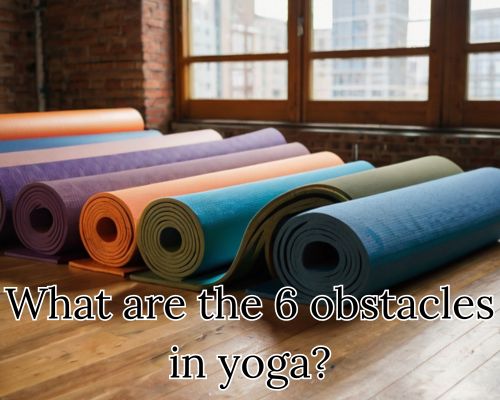
What Are the 6 Obstacles in Yoga? Understanding the Barriers to Inner Transformation in Mornington, Australia
Yoga, though often associated with flexibility and fitness, is primarily a discipline of the mind. Its true aim is union — with oneself, with consciousness, and ultimately, with the divine. But for many practitioners in serene coastal towns like Mornington, Australia, the journey from the mat to mindfulness isn’t without hurdles. In yogic philosophy, these hurdles are known as the 6 obstacles in yoga, or ṣaḍ-ūrmi in Sanskrit.

Understanding these six obstacles is essential for serious yogis and casual practitioners alike. Whether you’re attending classes at a local Mornington yoga studio or practicing asana by the bay at sunrise, knowing what holds you back is the first step toward overcoming it.
💠 The 6 Obstacles in Yoga (Ṣaḍ-Ūrmi): A Deep Dive
In the traditional teachings of Patanjali’s Yoga Sutras and supported by Ayurvedic and Vedantic philosophy, these six obstacles represent the inner enemies of self-realization. They are:
- Kāma (Desire)
- Krodha (Anger)
- Lobha (Greed)
- Moha (Delusion or Attachment)
- Mada (Pride or Ego)
- Mātsarya (Jealousy or Envy)
These are not just abstract ideas—they are living patterns of thought and behavior that subtly shape our daily lives. Let’s unpack how each of these plays out, especially in the context of modern-day yoga in Mornington.
1. Kāma – The Desire That Distracts
Desire isn’t inherently wrong; it’s natural to want success, comfort, or even deeper spiritual experiences. But in yoga, kāma refers to excessive craving — the kind that pulls you away from the present moment.
In Mornington’s wellness scene, filled with health cafes, beach yoga sessions, and spiritual retreats, it’s easy to fall into the trap of desiring the image of being a yogi rather than embodying the practice authentically. True yoga asks you to move from indulgence to contentment (santosha).
LSI keywords: spiritual craving, ego in yoga, attachment in yoga practice.
2. Krodha – The Fire of Anger
Anger arises when desires are unmet. In yoga, krodha clouds mental clarity and disturbs the peace that meditation and pranayama aim to build.
For locals in Mornington juggling the pace of modern life — traffic on the Nepean Highway, busy schedules, and the stress of maintaining work-life balance — it’s understandable that frustration arises. But yoga teaches us to respond, not react. Anger is seen as a moment of loss of self-awareness, an obstacle to the stillness required in dhyana (meditation).
3. Lobha – The Grasping of Greed
Lobha, or greed, goes beyond material accumulation. In yoga, it manifests as the relentless pursuit of more — more poses mastered, more advanced sequences, or more recognition in the yoga community.
Yoga is not competitive. Yet in social-media-driven culture, even in tranquil areas like Mornington, it’s easy to compare your journey with others’. Real transformation begins when the inner self stops grasping and starts surrendering.
Local relevance: Mornington yoga teachers often emphasise ahimsa (non-harming) and aparigraha (non-possessiveness) to counteract greed — principles highlighted at community hubs like Bikram Yoga Mornington or Hot Yoga Mornington.
4. Moha – The Fog of Delusion
Moha is delusion — clinging to illusions about who we are or what brings us fulfillment. In a consumerist society, this could look like chasing external validation through appearance, luxury, or even spirituality itself.
In yoga, moha prevents clarity of purpose (svadharma). Mornington’s vibrant wellness economy offers both a challenge and an opportunity: it can either feed illusions, or become a ground for deep, conscious living when approached with self-inquiry (svadhyaya).
5. Mada – The Illusion of Superiority
Mada is intoxication with one’s own importance. It can arise in subtle ways, like feeling superior for following a spiritual path, or believing one’s method is the best.
In group yoga classes across Mornington — from boutique yoga dens to oceanfront sessions at Mills Beach — ego can creep in disguised as confidence. Yet humility (vinaya) is key to growth. The best yoga teachers gently guide students to focus inward, not upward on a social ladder.
LSI keywords: yoga and humility, ego death, spiritual arrogance.
6. Mātsarya – The Poison of Jealousy
The final obstacle, matsarya, is envy. It quietly undermines our inner peace and distances us from the heart of yoga: unity and compassion.
Whether you’re admiring someone’s perfect handstand or their yogic glow, envy is a cue to shift focus. Instead of comparison, yoga encourages witness consciousness — the ability to observe without judgment.
Mornington’s supportive yoga scene often cultivates this through community classes and non-competitive yoga circles designed to celebrate all levels of ability and experience.
💠 Local Wisdom: Yoga Philosophy Meets Mornington Lifestyle
Mornington, situated on the beautiful Mornington Peninsula, is more than a backdrop — it’s a living environment conducive to inner and outer alignment. With natural sanctuaries like The Briars, and mindful spaces like Warrior One Yoga, practitioners have access to both nature and nurturing teachings.
Salient entities like:
- Patanjali’s Yoga Sutras
- The Briars Historic Park
- Warrior One Yoga Mornington
- Nepean Highway
- Hot Yoga Mornington
…all serve to ground this global practice in local soil.
Many local instructors like in Bikram Yoga Mornington incorporate yogic texts and Eastern philosophy in classes, making them rich with meaning, not just movement. They remind students that the ultimate aim of yoga is not mastering the pose, but mastering the self.
💠 How to Overcome the 6 Obstacles: Practical Tools for Mornington Yogis
Yoga doesn’t just diagnose these inner obstacles — it offers remedies:
- Kāma: Practice santosha (contentment) and focus on breath awareness.
- Krodha: Use pranayama (breath regulation) like Nadi Shodhana to cool the mind.
- Lobha: Cultivate aparigraha — non-possessiveness — through gratitude journaling.
- Moha: Deepen self-study with sacred texts or guided meditation at local retreats.
- Mada: Volunteer at yoga events or attend beginner-level classes as a refresher.
- Mātsarya: Focus on personal milestones and celebrate others’ growth sincerely.
💠 Final Thoughts: Yoga Is the Antidote, Not the Obstacle
The six obstacles in yoga are universal — yet overcoming them is a deeply personal journey. In Mornington, Australia, with its blend of coastal calm and thriving community spirit, you’re perfectly positioned to not only recognize these inner hindrances but to transcend them.
Let your practice become more than a habit. Let it be a mirror, a guide, and a path toward integration.
So the next time you roll out your mat in Mornington, remember: every obstacle is also an opportunity — an invitation to grow.


